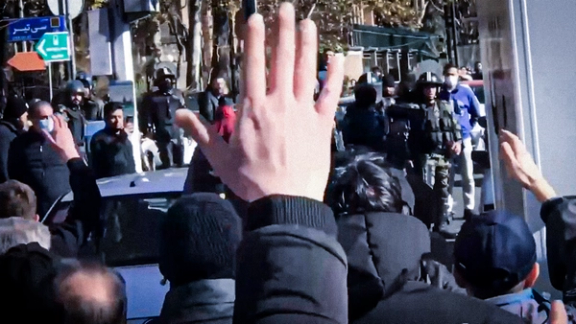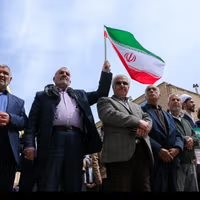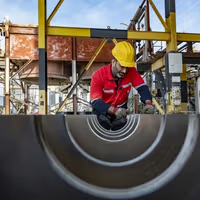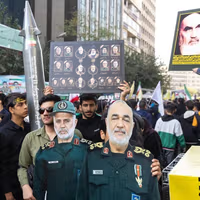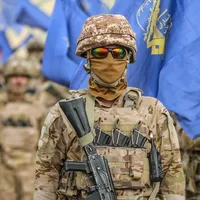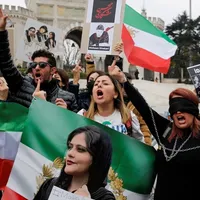Tehran says president to discuss nuclear, regional issues in Moscow
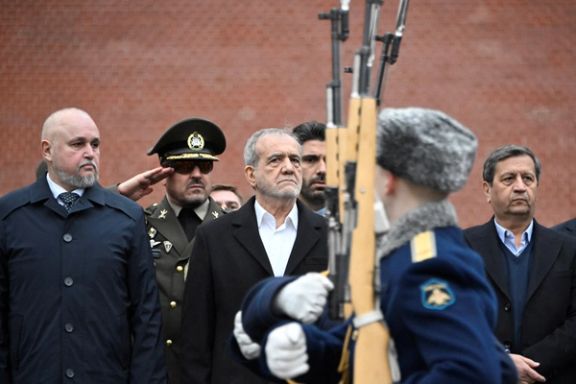
Iran's foreign ministry spokesperson on Friday said President Masoud Pezeshkian will discuss Iran's nuclear program with Vladimir Putin during his ongoing trip to Moscow.

Iran's foreign ministry spokesperson on Friday said President Masoud Pezeshkian will discuss Iran's nuclear program with Vladimir Putin during his ongoing trip to Moscow.
Without providing further details, Esmaeil Baghaei, the spokesperson for the Ministry of Foreign Affairs, added in an exclusive interview with RIA Novosti that "developments in Syria and Gaza will be key points of discussion during the Iranian president's visit to Moscow." He also emphasized the expectation that "Russia will play a more prominent role in pressuring Israel to uphold its commitments and stop the violence."
The visit comes at a time of significant regional upheaval. Last month, Iran and Russia lost their key Middle Eastern ally, Bashar al-Assad of Syria, when Islamic insurgents swept down from the north and seized Damascus within days.
Meanwhile, Iran’s nuclear program remains a contentious issue. The Islamic Republic began violating the enrichment limits set by the 2015 JCPOA nuclear agreement after the US withdrawal from the accord in 2018. Following President Joe Biden’s election, Tehran announced it would increase uranium enrichment to 20% purity, later escalating to 60%—a level widely regarded as just short of the threshold for producing fissile material suitable for nuclear weapons.
Negotiations with the US and the European E3 countries—the UK, France, and Germany—failed to resolve key differences, revive the JCPOA, or establish a new agreement. As a result, Iran is now believed to possess enough 60% enriched uranium to potentially produce four to five atomic bombs, should it choose to pursue nuclear weapons.
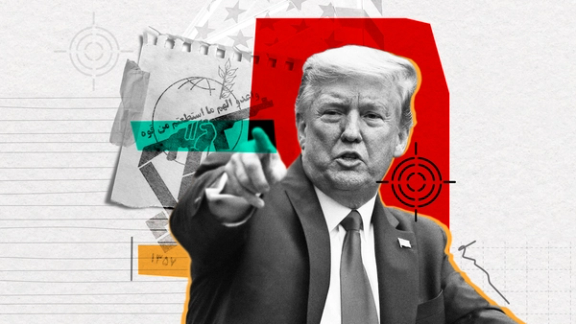
Iranian officials find themselves in a Shakespearian dilemma over whether to negotiate with the incoming Trump administration. Engaging would mean justifying or apologizing for past intransigence, while refusal risks confronting a deeper existential threat.
A fierce battle is unfolding between centrist politicians, such as President Masoud Pezeshkian, who favors dialogue with Trump in an effort to solve the country's economic problems as he told the NBC News channel, and hardliners who accuse the proponents of negotiations with the Trump Administration of selling out the country to the United States. Meanwhile, Foreign Minister Abbas Araghchi attempted to take a neutral stance, stating that the Ministry simply implements decisions made by the political system. "Decisions will be made by the authority that has to decide," Entekhab News quoted him as saying.
These conflicting views among Islamic Republic officials and politicians regarding negotiations take place against the backdrop of Supreme Leader Ali Khamenei's firm opposition to talks with Donald Trump, primarily due to Trump's role in the assassination of former IRGC Quds Force Commander Qasem Soleimani.
The positions of both men are well-documented and publicly accessible. Khamenei's opposition to negotiations with Trump is explicitly stated on his official website, while clips of Trump’s televised statement admitting to ordering Soleimani’s killing are widely circulated on social media. Neither can deny their past remarks.
A senior member of Khamenei's office, Mehdi Fazaeli, told the press in Tehran on Wednesday: "I say loud and clear, and with the highest degree of certainty that negotiations with the United States will not serve our national interests."
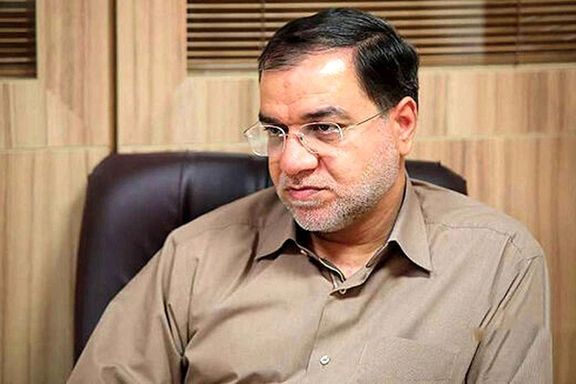
At the same time, Foreign Minister Araghchi has stated that "Iran might start negotiations if Washington returns to the 2015 nuclear deal." However, this scenario seems unlikely, given that it was Trump who unilaterally withdrew from the agreement, known as the Joint Comprehensive Plan of Action (JCPOA), in 2018.
Furthermore, it seems highly unlikely that Iran's nuclear program would be the sole focus of negotiations between Khamenei's Islamic Republic and Trump's America. The West has repeatedly emphasized its demand for Iran to cease harboring and supporting “terrorism” and armed proxy groups.
Although Israel’s attacks against Iran’s regional proxy groups have diminished their prominence on the negotiation agenda, the United States, Europe, and even China remain concerned about the Yemeni Houthis’ attacks on Israel and international navigation in the Red Sea.
The Didban Iran website quoted Fazaeli as saying: "Supporters of negotiations believe they can resolve Iran's economic problems, while opponents argue that not only will negotiations fail to address these issues, but they may also lead to new challenges."
Fazaeli, regarded as a voice reflecting Khamenei’s views, stated that "the Islamic Republic, rooted in its ideology, cannot engage in talks with oppressors and imperialists." He further argued that "America's positions on the Panama Canal and Greenland are clear evidence of its imperialist nature."
"Meanwhile, our experiences negotiating with the United States, whether over the release of US hostages in 1981 or the nuclear deal in 2015, have reinforced our distrust of America," he said, notably without expressing any regret over the 1979 hostage-taking of US diplomats.
Hardline daily Kayhan, close to Khamenei's office, characterized Pezeshkian's remarks in his NBC interview about the possibility of talks with the Trump Administration as "Begging America for negotiations," and added: "That is madness."
While Iranian hardliners are well-known for their staunch opposition to rapprochement with Washington, other Iranian politicians also frequently resort to anti-US rhetoric. Earlier this week, in an ironic twist, Speaker Mohammad Bagher Ghalibaf repeatedly chanted "Death to America!" in an effort to pacify an outraged hardliner MP who was railing against the US in parliament.
The apparent divide among Iranian politicians over negotiations could be a calculated strategy to present a united front in disagreement, aimed at convincing US negotiators that significant concessions are needed from Washington to overcome internal opposition. At the same time, they may seek to reassure Russia during an upcoming meeting between President Pezeshkian and Vladimir Putin in Moscow on Friday that the prospects for Tehran-Washington relations remain uncertain.
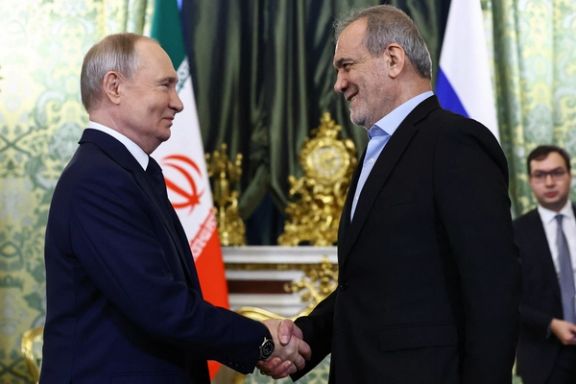
Iranian President Masoud Pezeshkian met with Russian President Vladimir Putin in Moscow on Friday to sign a long-term pact, widely regarded as a sign of the growing ties between the two countries.
"Our enhanced relations will thwart the plans of those seeking to destabilize the region and impose their policies," Pezeshkian reportedly said in the meeting.
According to Iranian state-controlled media, Pezeshkian described Iran-Russia relations as sensitive and strategic, and stressed Tehran's commitment to deepening ties.
The comprehensive strategic partnership agreement, as it has been referred to, is seen as a means for Moscow and Tehran to navigate Western sanctions by strengthening their political and economic ties.
The 20-year-treaty, while not constituting a mutual defense pact as noted by the Iranian ambassador to Moscow, will formalize commitments to closer defense cooperation, according to the Russian foreign minister.
Pezeshkian also reportedly suggested that progress had been made on a joint project to build a new nuclear power plant in Iran.
"We have worked to remove barriers to expanding our relations," Pezeshkian added.
On his inaugural visit to the Kremlin since he was elected in July 2024, Pezeshkian was accompanied by a high-level delegation from the Islamic Republic, comprising ministers, senior officials, and a parliamentary representative.
"Iran is an important partner for us with which we are developing multifaceted co-operation," Kremlin spokesperson Dmitry Peskov told reporters ahead of Pezeshkian's meeting with Russian President Vladimir Putin.
The Kremlin previously said the pact would elevate the two state’s partnership to a strategic one.
The messaging from Tehran, including remarks by government spokesperson Fatemeh Mohajerani, sought to convey optimism, suggesting that the treaty will open “new horizons” for Iran-Russia relations.
In an interview with Russia's TASS ahead of the visit, the Iranian ambassador to Russia said that the pact would send a "clear signal" to other countries.
"The ability to cooperate between the two countries is a political issue to help advance international cooperation towards a new world order," Kazem Jalali said.
While Tehran has previously expressed its hope for accelerated cooperation in the North-South Corridor and the Russia-Iran gas transfer project – there has been little progress on Iran becoming an energy hub for Russian gas.
As several analysts have noted, the pact’s timing is a sign that Moscow and Tehran are bracing for Donald Trump’s return to the White House this month.
Hanna Notte, expert in arms control, security, and Russian foreign policy, said in a thread on X, that both countries have emerged as “losers” in the post-October 7,2023 Middle East, referring to the weakening of Iran's "axis of resistance" due to Israeli-led attacks and the fall of Syrian President Bashar al-Assad, a key ally to Russia and Iran.
“Both Russia & Iran see some utility in signaling the robustness of their partnership at this time - and that Trump won't be able to drive a wedge between them,” Notte wrote.
Nearly three years on, Russia's war on Ukraine continues, with Iran playing a key role as Moscow's ally in supplying drones and missiles. Iranian-made drones, including the Shahed series, have been crucial in Moscow’s attacks on Ukrainian infrastructure. Reports also suggest that Tehran provided ballistic missiles to enhance Russia's military capabilities.
Advisers to Trump, who takes office next Monday, are reportedly crafting a wide-ranging sanctions strategy to facilitate a Russia-Ukraine diplomatic accord in the coming months while at the same time squeezing Iran, people familiar with the matter told Bloomberg.
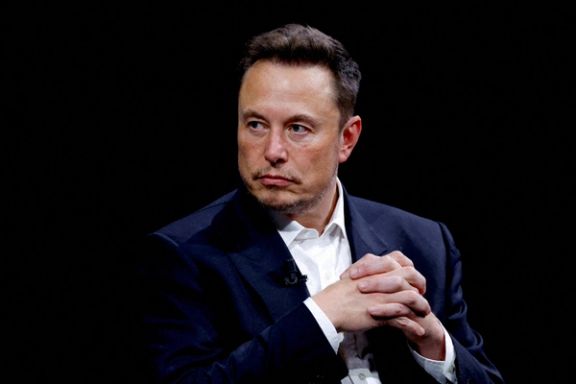
Elon Musk says he had no direct involvement with Tehran in the release of Italian journalist Cecilia Sala from Iran but supported efforts through the US side.
Writing on X, Musk said Thursday, "I haven’t had any interaction with Iran. Just recommended support from the US side."
His statement follows comments from Esmaeil Baghaei, spokesperson for Iran's Ministry of Foreign Affairs, who labeled reports of Musk’s involvement as "media storytelling and pure fabrication."
On Wednesday, The New York Times reported that Elon Musk helped secure the release of Ms. Sala by reaching out to Iran’s ambassador to the UN, Amir Saeid Iravani, citing two Iranian officials. In November, the same publication wrote that Musk had a secret meeting with Iravani, which Iranian officials denied.
Also, Italy's Foreign Minister Antonio Tajani said on Friday that Musk played no role in negotiations between Italy and Iran for the release of Sala.
"Musk ... has nothing to do with Cecilia Sala's case. He played no role. The case was settled by the Italian government," Foreign Minister Antonio Tajani told broadcaster SkyTG24.
Cecilia Sala, a 29-year-old journalist and podcaster, was arrested in Iran last month on unspecified charges despite holding a valid press pass. Her solitary confinement raised international concerns about her safety and well-being.
A source familiar with discussions between Sala's family and the Italian government told Iran International that Tehran tied her release to Italy’s handling of Mohammad Abedini Najafabadi, an Iranian detained in Italy at the request of the United States. Iran, however, denies any connection between the two cases.
Sala was freed last week, and shortly afterward, Najafabadi was also released by Italian authorities, as confirmed by Iran's Judiciary.
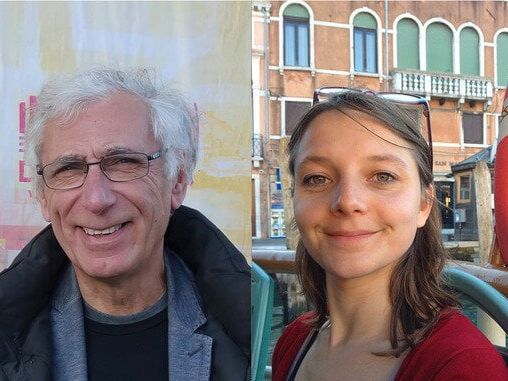
Two French nationals have spent nearly three years in Ward 209 of Tehran’s Evin Prison, their freed compatriot said, a secret detention facility notorious for harsh conditions which is operated by the country’s intelligence ministry.
In his first interview since his release in June 2024, Louis Arnaud described the harrowing realities of life in the ward, where prisoners face extreme isolation, constant surveillance and relentless psychological pressure.
“Jacques (Paris) and Cécile (Kohler) have been there for almost three years now,” Arnaud told FRANCE 24.
Arnaud, a banking consultant, was arrested in September 2022 while traveling through Iran and was sentenced to five years on national security charges he says were baseless.
Held in Ward 209 for six months, he described his cell as a windowless eight-square-meter room illuminated 24 hours a day and monitored by cameras. “Everything is done so that you are deprived of your humanity,” he said.
"You are completely shut from the world. The world ceases to exist. The only thing that reaches you are the screams and the yells of other prisoners coming from nearby cells. And you are completely also shut from your family and even more from the embassy, of course," he added.
Prisoners in Ward 209 endure blindfolded interrogations, forced confessions and limited contact with the outside world, according to Arnaud.
"It is important to understand that these conditions are there ...This torture aims at when they take you to the interrogations, blindfolded, that you will confess what they've decided that you need to confess. Those can be either signed confessions or sometimes even forced confessions, like it was the case for Cécile and Jacques."
“There is absolute urgency to take them and Olivier out of there,” Arnaud said, referring to another French national detained in Shiraz.
Arnaud said he was allowed only three tightly monitored phone calls with his family during his detention, which he described as “psychological torture.” He expressed deep concern for Paris and Kohler, as well as Ahmadreza Djalali, a Swedish-Iranian academic detained for nearly nine years and facing execution.
Arnaud also recounted meeting Mohsen Shekari in prison, the first protester executed following Iran's 2022 protest movement triggered by the death of a young woman, Mahsa Amini, in morality police custody.
“When we met, he told me, ‘You know, Louis, yes, I went to the streets. But you know why? It’s because I just wanted a normal life with a normal job that pays enough so that I can have a little bit of freedom and live a normal life.’” Shekari was executed a few weeks later.
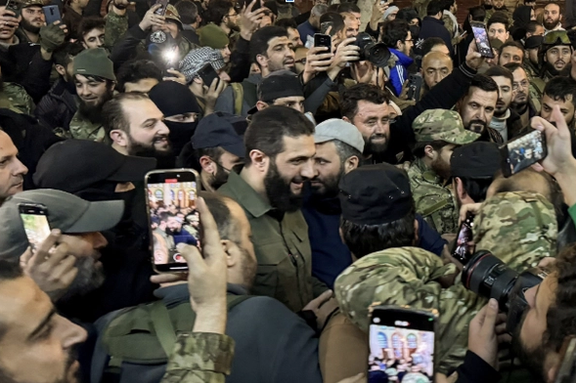
Israel has no justification to keep its forces inside a UN-demarcated buffer zone inside Syria now that Iran and its allied groups have been banished from the country, de facto leader Ahmed al-Sharaa said on Thursday.
“Israel’s advance in the region was due to the presence of Iranian militias and Hezbollah. After the liberation of Damascus, I believe that they have no presence at all,” al-Sharaa said in a joint press conference with Qatar’s prime minister Sheikh Mohammed al-Thani.
“There are pretexts that Israel is using today to advance into Syrian regions, into the buffer zone,” al-Sharaa said, adding that he would welcome the United Nations peace-keeping forces there.
Israeli military units advanced to the UN-designated demilitarized region that separates Israeli and Syrian-controlled parts of the Golan Heights after president Bashar al-Assad was ousted by opposition forces led by al-Sharaa’s radical Islamist group, Hayat Tahrir al-Sham (HTS).
Al-Sharaa called on Qatar and western powers to help push the Israelis out of the buffer zone.
“Qatar no doubt has a big role to play,” he said. “They will play an active role in continuing to exercise pressure [on Israel to withdraw] together with Western and European nations and the United States of America.”
The Qatari prime minister seconded al-Sharaa’s call for Israel’s withdrawal.
“The Israeli occupation’s seizure of the buffer zone is a reckless and provocative act, and it must immediately withdraw,” he told reporters.
The call for UN peacekeepers in the buffer zone raises the possibility of new mediation efforts, but it remains unclear whether key players including those al-Sharaa mentioned will push for such measures.
